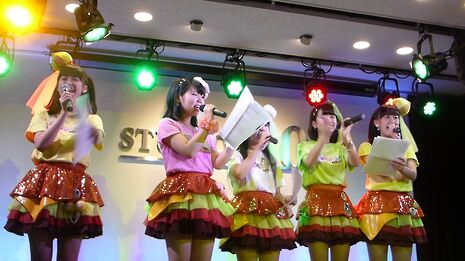In with the aidoru: controversy, cheese and cuteness in Japanese pop
In this week’s column, Anna Hollingsworth explores cheesy Japenese pop from her year abroad, discovering close parallels with Western pop culture, but brought to new extremes

I’ve been known to have a certain predisposition for cheese in music (and on my pasta, as a matter of fact, but that’s beside the point). Nothing summarises my emotions better than Britney’s ‘Oops!... I Did It Again’ when, once again, I’m frantically typing up the conclusion to my supervision work minutes before the deadline, nor does anything capture the fateful pre-exam atmosphere better than Abba’s ‘Waterloo’ (“I tried to hold you back but you were stronger... And now it seems my only chance is giving up the fight”). And to all my neighbours, past and present: surely there is no sweeter alarm clock than ‘Wake Me Up Before You Go-Go’ blasting through our mutual paper thin wall?
Despite being a self-diagnosed cheese addict to the extent that I’ve been told ‘bbz, you are Britney’ on several occasions, Japanese pop idol culture is on a whole new level even for me. A lecture on the topic where the teacher decided to go for the play-music-videos-at-dim-foreign-students approach left me wide-eyed at what happens in the Japanese pop idol scene; Britney, you gotta work, b*tch, to beat your Japanese rivals.
It sings, dances, and seems to exist only to be cute: what pop star wouldn’t fit the bill? But in Japan, the concept of idol, or aidoru in the word’s Japanese rendering, has gone where no Western idol has gone before. The shopping and party centre of Shibuya is characterised by pictures of baby-faced boys and overly cute girls plastered all over buildings, and happy-go-lucky kinda tunes playing in the streets – just think of Oxford Street ringing with Justin Bieber, and you get the idea (the latter image is nearing my definition of apocalypse, to be honest).

Aidoru are no ordinary pop stars, and the term has a much more restricted meaning than its English equivalent. It was commercialised by talent agencies searching for fresh-faced, inexperienced youths, so that a singer (or model, or actor, for an aidoru has as many talents as Justin Bieber has meme apperances) is an aidoru only if their path to fame was through one of these agencies.
The on-march of these teens and 20-somethings was launched after WWII and a general disillusionment with the world, leading the nation to dump their Shinto gods and Buddha statues and to turn to the media instead for objects of idolisation. With nuclear bombs dropped onto the country, who can blame anyone for finding solace in the wise words of the likes of Pink Lady rather than Siddhartha Gautama?
Since then, these talent agencies have provided the world with a steady flow of joy in the form of the likes of Juice=Juice (perhaps there is a hidden meaning in the band’s name that is as revolutionary as E=MC2 but for the time being it very much escapes me), Babymetal with an emphasis on ‘baby’ rather than ‘metal’ (think chipmunks on helium), and the more humorous Hamburgirl Z, each member of which represents a different element of a burger (I would like to have been present when the marketing team came up with this idea – ‘You know how the UK had Baby Spice and Sporty Spice… Why don’t we go for Processed Meat Spice and Gherkin Spice?!’).
There’s also the oh-so-naughty Sexy Zone with imaginatively named albums ranging from One Sexy Zone and Sexy Second to Sexy Power3, and the new hit, Welcome to Sexy Zone. After listening to the boy band’s output, I can confirm that the boy quintet was recruited for their looks rather than their vocals. Now I’m just crossing my fingers that my internet isn’t disabled because of some of the rather adult Google hits I got doing my research on said band.

Of course, Sexy Zone wouldn’t be sexy and nor would Hamburgirl Z be, well, scrumptious, without a dedicated fan base. Pop idol fans have earned a place as a subtype of otaku, a derogatory term for people who are so into a hobby that it forms a major part of their identity, stereotyped as obsessive and borderline crazy – think rowers at Sunday brunch in their one pieces and never-ending chat about bumping Maggie, chasing Emma and other things that sound like a consent workshop is sorely needed. The idol fan subtype goes by the name wota, and can be found collecting magazines and posters of their object of affection, their natural habitat being anywhere in the proximity of their idol.
Now, wota is associated with younger people, and idols are constructed to offer a safe target for unrequited teenage love and budding sexuality, but idols take on a whole new role in the adult world. The stereotypical salaryman, a Japanese business man notorious for churning out inhumane working hours, will blast his nights away singing to classic idol hits like ‘Don’t Take Off My Sailor Clothes’ or ‘Funky Girl Walking’ in karaoke. And for the stereotypical housewives married to them, boy band idols offer a way to escape Japan’s prescriptive gender ideals and to prioritise their own sexuality.
The online community Arashi Housewife Club dedicated to the band Arashi, for example, says: “All you housewives with a loving family but who have fallen for these five cute people. Escape from reality for a little while, and let’s talk lots about cute Arashi!” Single-sex groups are also a, um, fertile ground for homoerotic art: separate from the idols’ management companies, the pop culture scene is rife with unofficial magazines and comics, and artists producing images for fans’ particular needs featuring band members in various off-stage scenes.
But not all is well in happy-clappy aidoru land. I mean, you’ve got to be a bit suspicious when something looks as perfect as your standard Jehovahs’ Witnesses’ brochure in its bright colours and omnipresent happiness. The bottom line is that the entertainment industry is all about commercialism, no matter how cute their premises, and aidoru are churned out to make money in a way that doesn’t go with things that you might consider basic values like freedom of choice, no exploitation, and no ageism. In one of the biggest aidoru successes of today, the girl band AKB48 (AKB stands for Akihabara, the general geek centre of Tokyo, with 48 being the number of band members), members are forced into retirement at the tender age of 25.
The AKB48 girls are also meant to be purer than Catholic nuns, signing contracts promising to keep any relationships strictly secret from the public. When AKB48 singer Minami Minegishi was caught leaving the house of a boy band member who had welcomed her into his sexy zone, as it were, she was demoted to the band’s trainee team and forced to apologise for her thoughtless behaviour on YouTube, bawling her eyes out and sporting a shaved head, in all likelihood not done out of her own free will.
Ironically, AKB48 has come under fire for its risqué music videos: in ‘Heavy Rotation’, the group’s members, many of them under 18, go frolicking in fancy underwear, the cameras zooming into the singers’ frilly panties when they’re actually singing and not bathing together and kissing each other as they do for the majority of the video. With the group’s music video antics verging on child porn, perhaps Minami Minegishi shouldn’t be the only one shaving her hair – who knows, maybe a collective AKB48 shaving effort could be made into an Anne-Hathaway-in-Les-Mis style Oscar-nomination worthy performance?
Controversy, cheese, cuteness: an idol or an aidoru, the basics are the same, even if in Japan everything seems to be to the power of 10. But with over two months of being exposed to the cheesiest cheese, I’m afraid to say that I’m starting to take a shine to the aidoru. No, I won’t be joining the Arashi housewife club just yet nor moshing my nights away to Babymetal, but be prepared, my future neighbours – you may be woken up by the sweet voices of Hamburgirl Z or lulled to sleep by the sounds of Sexy Zone echoing from my room
 News / Caius mourns its tree-mendous loss23 December 2025
News / Caius mourns its tree-mendous loss23 December 2025 News / Clare Hall spent over £500k opposing busway 24 December 2025
News / Clare Hall spent over £500k opposing busway 24 December 2025 Comment / Yes, I’m brown – but I have more important things to say22 December 2025
Comment / Yes, I’m brown – but I have more important things to say22 December 2025 Interviews / Politics, your own way: Tilly Middlehurst on speaking out21 December 2025
Interviews / Politics, your own way: Tilly Middlehurst on speaking out21 December 2025 News / King appoints Peterhouse chaplain to Westminster Abbey22 December 2025
News / King appoints Peterhouse chaplain to Westminster Abbey22 December 2025








